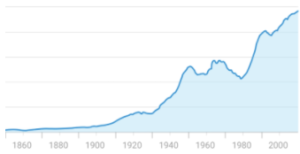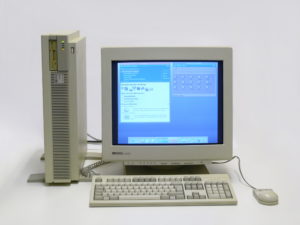-
United Kingdom
- Sign in
Updated: 10 July 2020
Businesses across the country work hard all year round. To celebrate their devotion and their contribution to the economy, this festive season we’re presenting our very own Christmas Carol. Last week we looked at the history of small businesses, from medieval times to the early 1900s. Today it’s time for small business present, so read on to learn about the impact they have on today’s world and the trends that have helped them along the way.
Before we get to the modern day, it’s useful to look back over the last few decades to understand the changes that led us here. In the 1960s, small businesses were struggling. Television and globalisation were having a huge impact on the world, and big business was booming.

Piccadilly Circus at night circa 1960 – David Howard
Shoppers wanted to go to big supermarkets and buy the globally recognised brands they saw on TV. Local shops and independent producers struggled to compete, and their market share dropped dramatically. In everything from farms to finance, large corporate players bought out their smaller rivals, and manufacturing jobs were taken abroad for cheaper labour. Coupled with a thriving stock market and a flourishing electronics and information industry, more and more people moved from manual work to office-based roles.
Such was the preference for big business, even the term “small business” saw a decline. Business owners across the western world faced a squeeze, and starting your own enterprise was an increasingly rare thing to do.

This graph shows the use of “Small business” in English books over time
A career-minded office worker in the 1970s planned to become an increasingly important fish in a big corporate pond. However, as the 1980s progressed, entrepreneurs began to break out on their own once more. While some business owners desired independence and others were laid off, collectively there was a cultural shift away from corporate life, and entrepreneurship was a common aspiration once more.
The 1990s saw the widespread adoption of home computing and the internet. Not only did this make it easier to run a business from your own home, entrepreneurs could access a global market at the touch of a button. By drastically reducing overheads, it lowered the barriers to entry for newcomers. Established businesses could now also compete on a more even footing.

Hewlett-Packard HP9000 Unix Workstation – Thomas Schanz
An advantage small businesses have always had is their adaptability. Without hierarchy and extensive processes, they are more nimble in responding to a changing marketplace. Employees also have more varied roles and skill sets, as they have to carry out multiple business functions with a smaller staff base. As the pace of change continues to accelerate through the digital age, savvy entrepreneurs can seize opportunities quickly. Large corporate firms, on the other hand, can be cumbersome to respond.
Faith in institutions, whether they are government, media, NGOs or corporations, is also at an all time low. The volume of opinion available today means they no longer hold the sway they once did, and scandal after scandal across every industry has destroyed the trust people once had.
Now customers are looking for alternatives. What they crave most is authenticity, and small businesses are ideally placed to step in. Whether they’re an IT provider or an artisan bakery, small businesses tend to be specialists. They have a natural authenticity as experts in their chosen field, allowing them to engage with their audience more genuinely. They can then appeal to a slice of the market that large companies will struggle to reach.

David from The Creative Whisky Company – a Funding Circle borrower
These cultural and technological trends have led to an unprecedented boom for small businesses. Today there are 5.7 million businesses in the UK, an increase of 2.2 million since 2000, and up from just 700,000 a few decades ago. 99% of them are small businesses, showing the incredible impact they have on our economy:
A recent survey found that 84% of people who work for themselves are “more satisfied in their working lives”. Less than 5% of owners plan to close their business down and move back to a more traditional job.
Even the political uncertainty of events such as Brexit have not dampened the rise of entrepreneurs. Over 400,000 new businesses have been created in the last two years, with 67% saying that they are expecting to see an increase in turnover during the next 12 months.
Along with the new opportunities in digital marketing and management, new sources of funding are helping small businesses thrive. Online lending and crowdfunding give entrepreneurs better access to the funding they need. This not only helps them get started, but allows them to grow and become more resilient to changing economic times.
Added together, it truly is a golden age for entrepreneurs and small business. Long may it continue.
Read our other chapters on the history of small businesses and the trends that will shape small business life in the future.

5779 REVIEWS